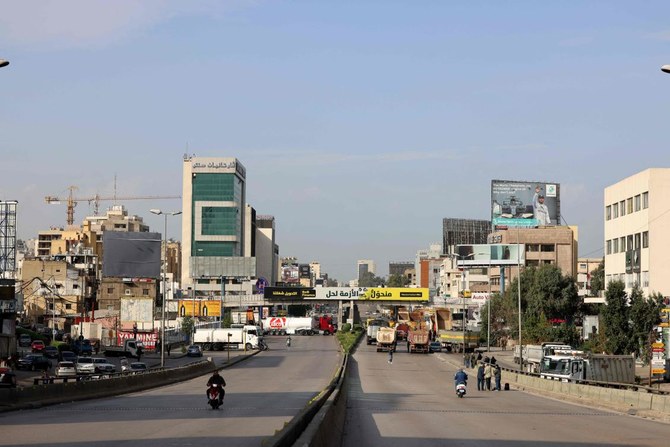BEIRUT: Internet services were disrupted in Lebanon Sunday because of diesel shortages, according to the state provider, adding another essential service to the list of casualties of the country’s snowballing economic crisis.
Imad Kreidieh, the head of state Internet provider Ogero, tweeted that starting early Sunday a major station in west Beirut, Al-Mazraa, would run out of diesel and go offline. The outage affected over 26,000 subscribers, including the country’s General Security operation rooms, he told Al-Jadeed TV.
By midday Sunday, a resident donated diesel, allowing the station to get back online, he said. Meanwhile, another neighborhood in east Beirut, Achrafieh, was out of diesel and operated on batteries.
“The situation is unbearable,” Kreidieh told the TV station.
Lebanese live with only few hours of state electricity a day and rely on a network of private generators that also depend on diesel fuel. This often leaves neighborhoods in total darkness for hours. Meanwhile, residents have to pay for multiple services, including hefty bills to generator operators, which change regularly as the crisis worsens.
Internet and telecom services already were expensive in Lebanon. In 2019, a tax imposed on WhatsApp services sparked nationwide protests that turned into a denunciation of the entire political elite.
The import-dependent country is also suffering from shortage of medicines, leaving patients dependent on black market, smuggled medicines and donations from Lebanese expats and civil groups.
Lebanon is in the throes of the worst financial and economic crisis in its history that has sunk the once middle-class country into poverty.
The crisis is rooted in years of corruption and mismanagement by the same political class that has ruled for years. Lebanon is running out of foreign reserves and has gradually lifted subsidies on essential goods, including fuel and medicines.
But the government has yet to implement a social safety program or draft a recovery plan to negotiate with the International Monetary Fund.
The crisis caused the national currency to lose more than 90 percent of its value to the dollar while banks, fearing bankruptcy, have limited people’s access to their deposits in local and foreign currency. Meanwhile inflation has soared and prices increased.
The state-owned and other telecommunication companies complain they can’t keep up with rising operational costs, including fuel.
“I will not agree to continue in this post unless I have all the authorities and tools to do my job,” Kreidieh told Al-Jadeed.
He blamed the service interruption in west Beirut on a civil servant who didn’t sign a piece of paper on time to allow him to buy needed diesel. Amid the crisis, many public sector workers have gone on strike, demanding their salaries be adjusted to rising inflation and a collapsing currency.
Kreidieh said Internet service is also affected outside of Beirut.
Lebanon faces Internet service interruption amid fuel crisis
https://arab.news/8e4n8
Lebanon faces Internet service interruption amid fuel crisis

About 50,000 worshippers perform Taraweeh prayer at Al-Aqsa Mosque

- Palestinians are observing Ramadan amid heightened tensions in the occupied West Bank
- Over 300 Jerusalemites have recently received Israeli orders prohibiting their entry to Al-Aqsa Mosque during the fasting month
LONDON: Nearly 50,000 worshippers performed the Isha and Ramadan Taraweeh prayers on Sunday evening at the Al-Aqsa Mosque in the walled city of occupied East Jerusalem.
Thousands of Palestinians gathered at Al-Aqsa despite facing Israeli military checkpoints and strict identity checks at the mosque’s gates, according to the Jerusalem Governorate.
Palestinians are observing the fasting month of Ramadan, which began last Wednesday, amid heightened tensions in the occupied West Bank, including attacks by settlers, and Israeli raids and arrests.
Over 300 Jerusalemites have recently received Israeli orders prohibiting their entry to Al-Aqsa during Ramadan, the Wafa news agency reported.
Israeli forces have increased their military presence in Jerusalem and restricted access to Al-Aqsa to children under 12, men over 55, and women over 50.
Since Wednesday, thousands of Palestinians have lined up to pass through military checkpoints, including Qalandiya and Bethlehem, in hopes of attending prayers at Al-Aqsa Mosque during Ramadan.














